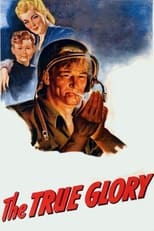CinemaSerf
Jul 23, 2025
7/10
This is probably the earliest example of what you could call a “complete” documentary depicting the end of World War II. Starting with the planning for and then the implementation of the D-Day landings, and using hundreds of different pictorial sources, this takes us on a fairly comprehensive and often quite harrowing journey from the beaches of Normandy to the streets of Berlin. It’s introduced by Gen. Eisenhower and he occasionally contributes to the soundtrack, but for the most part this is narrated by the ordinary soldiers, sailors, fliers and civilians whose lives were affected by this huge-scale military and logistical operation. It’s that commentary that stands out well here, offering us some poignant observations of their travails over the best part of a year in occupied France, the Low Countries and then finally Germany itself. Some of the comments are stoic and witty but never flippant. Each has a story to tell, an episode to describe, an encounter to recount - and for much of this, it’s against an enemy that had most certainly not given up. What’s also striking here is the collaborative delivery of it’s message. Those under the command of The King, Roosevelt and Stalin as well as those fighting for the freedom of those long-occupied territories speak openly and freely of their inter-reliance and abilities to work hand in glove - regardless of language difficulties, cultural or ideological differences and the archive illustrates that co-operation with a remarkable degree of comprehensiveness. Be warned, however, that those images also depict the ghoulish atrocities of not just the war, but of the liberation too. Of Belsen - and these images are not for the squeamish. They are truly appalling, and described by many who arrived there in 1945 with a degree of disgusted incredulity. Then we move on to scenes of ruin in towns and cities in the Fatherland before witnessing scenes of Göring and other staff officers signing documents and surrendering their weapons in defeat - in an altogether more dignified fashion. It doesn’t try to be political or analytical, it tells the story from the perspectives of those folks who fought the battles and won the war and is really worth a watch if you are ever looking for a potted, but potent, encapsulation of the end of the war in Europe.
